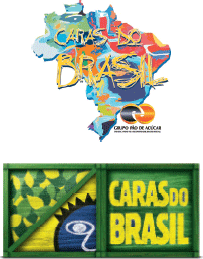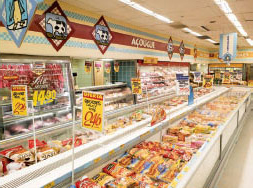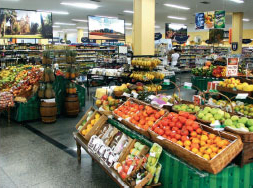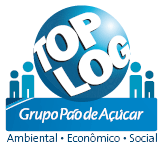| Suppliers Caras do Brasil [EC6]  Caras do Brasil (Faces of Brazil) is an innovative program in the retail sector launched by Grupo Pão de Açúcar in 2002 to sell products made by small organizations and communities that demonstrate social and environmental responsibility but would have difficulty in accessing large markets for their products. Caras do Brasil (Faces of Brazil) is an innovative program in the retail sector launched by Grupo Pão de Açúcar in 2002 to sell products made by small organizations and communities that demonstrate social and environmental responsibility but would have difficulty in accessing large markets for their products.In addition to serving as a sales channel for sustainable products and stimulating conscious consumption, Caras do Brasil has other values such as encouraging people to remain in their native place as well as promoting social inclusion and self-esteem of the communities through the generation of local wealth, besides valuing cultural and gender diversity. The eligibility criteria for the program include socially and environmentally responsible production practices, ability to meet deadlines and ensure consistent supply in compliance with health and safety laws. At present, Caras do Brasil has 55 suppliers in 17 states from whom it acquired 225 types of products in 2008, with 22% being food items and 78% being non-food items. It also received special investments for re-registration, revaluation and requalifi cation of suppliers, optimization of inventory turnover and refurbishment of its image by revamping the visual communication, promotional material and even the logo.
(In 2008, Grupo Pão de Açúcar redefined the volume of product inventories related to Caras do Brasil, which explains the difference between investments this year and last year.) Traceability – Meat The objective of this program, launched in 2003, is to offer consumers, through the Taeq brand, a product that incorporates sustainable practices in its production process envisioning the health of people, adequate treatment of animals and preservation of the environment. For this, Grupo Pão de Açúcar teamed up with Instituto Ethos and adopted the methodology of the Programa Tecendo Redes Sustentáveis (Tear – Weaving Sustainable Networks Program) in meat production. This methodology consists of evaluating the characteristics of the operation, drawing up plans for implementing sustainable management (social, environmental and economic) and consolidating the dissemination capacity of the trainees within the program’s relationship network.  Promoted by Instituto Ethos and the Multilateral Investment Fund of the Inter- American Development Bank, the Tear Program primarily aims to increase the competitiveness and sustainability of small and medium companies. Promoted by Instituto Ethos and the Multilateral Investment Fund of the Inter- American Development Bank, the Tear Program primarily aims to increase the competitiveness and sustainability of small and medium companies. To join the meat traceability program of Grupo Pão de Açúcar, cattle breeders should support and respect internationally recognized human rights and certify that their organizations are not party to the abuse and violation of these rights. As a direct result of this program, participants now adopt an active approach to social responsibility and carry out diverse initiatives such as literacy programs, among their employees. The reward for this approach comes in the form positive financial results for producers: Grupo Pão de Açúcar guarantees purchase of 100% of the animals born and pays the producers the highest price according to the Esalq – USP index for the region of slaughter. Taeq meat now represents 2% of total beef sales at Pão de Açúcar and Extra. Traceability – Fruits and Vegetables (FLV) Grupo Pão de Açúcar has a Program for the Control of Origin and Traceability of Fruits and Vegetables (FLV), which ensures that only the highest quality vegetables are sold. Through this program, Grupo Pão de Açúcar can trace the products right from their origin in the field to the store shelves, which facilitates mapping and makes it easy for the Group to take corrective and preventive action against suppliers when required, besides reducing inventory shortage.  Despite the excellent results obtained, Grupo Pão de Açúcar continues to invest in improving the program by implementing and consolidating an online database that can be accessed by suppliers, consumers and the company’s managers. The Group also works on improving the performance indicators so that producers can track their progress. Despite the excellent results obtained, Grupo Pão de Açúcar continues to invest in improving the program by implementing and consolidating an online database that can be accessed by suppliers, consumers and the company’s managers. The Group also works on improving the performance indicators so that producers can track their progress.Currently, 66% of the fruits and 60% of the vegetables originating from São Paulo state pass through the traceability system. Grupo Pão de Açúcar is also working on obtaining the ISO 9000 certification attesting to its compliance with a series of quality norms, which will give its FLV traceability program greater credibility. Conexões Sustentáveis (Sustainable Connections) In October 2008, Grupo Pão de Açúcar signed the Pacto Empresarial Conexões Sustentáveis: São Paulo-Amazônia, promoted by the NGO Movimento Nossa São Paulo and the Sustainable Amazônia Forum. The Group will participate in the Sustainable Connections program in three spheres – cattle, soy and wood. Under the Pact, the company undertakes not to acquire products from suppliers blacklisted by the Ministry of Labor for reason of slave labor, or those originating from land seized by the Brazilian Institute for Environment and Renewable Natural Resources (Ibama). The aim of this commitment is to prevent trading in cattle, soy and wood products that do not comply with labor and environmental legislation from being sent to São Paulo city. Quality of products Prevention and Losses [PR1] Since the quality of the products is fundamental to the success of Grupo Pão de Açúcar’s business, this issue receives extra attention. The quality control measures begin with the selection of suppliers, at the beginning of the supply chain, who are vetted based on the methodology of the British Retail Consortium (BRC), which considers nvironmental and social issues such as the treatment of industrial effluents, pest control, child and slave labor, recycling agreements and disposal of byproducts. In the six Distribution Centers situated in São Paulo, Rio de Janeiro, Brasília, Ceará, Pernambuco and Bahia, the products are also checked against the technical specifications, which include visual, sensorial, microbiological, physical and chemical analyses. Information in the labels and the validity period within limits, as per national legislation are also checked. The cargo and the lots received at the Distribution Centers are analyzed with the help of instruments such as thermometers, penetrometers, refractometers, pH measuring instruments and calipers.  Strict storage control and periodical inspection are carried out at the Distribution Centers, thereby assuring the quality of the products before they are distributed to Strict storage control and periodical inspection are carried out at the Distribution Centers, thereby assuring the quality of the products before they are distributed to the stores. Another important concern of Grupo Pão de Açúcar is the monitoring of agrotoxins, which began in 2002 at Recife (PE) with the Agrotoxic Residues Analysis Program (Para) of the National Health Surveillance Agency (Anvisa). Between 2002 and 2006, the Program conducted 3,888 tests for the conformance level of 82%. From 2007 to 2008, more than 530 tests were conducted, for conformance level of 95%, thanks to the improvements made by suppliers on the field and the controls at the Distribution Centers. In 2008, Grupo Pão de Açúcar also began work on Supplier Performance Control (CDF) with the key objective of tracing products till the point of sale and enable the improvement of its FLV producers. The quality control professionals of Grupo Pão de Açúcar form a multidisciplinary team of agronomists, biologists, chemists, zootechnicians, veterinarians, biomedical professionals, nutritionists and engineers from the food, textile, material, chemical and electronic engineering areas. At the stores, a team of veterinarians and intern nutritionists ensure compliance with the operational hygiene best practices, called Food Safety. Imported Goods The food and non-food products imported by Grupo Pão de Açúcar are checked at the origin itself by globally renowned inspection companies according to Brazilian laws, the Group’s internal norms, international regulations such as the ANSI/ASQC C1.4-2003 sampling plan and the respective inspection protocols. Thanks to this concern for quality, the Group can, for example, offer a 12-month warranty on imported electronic goods, which is four times more than required by Brazilian legislation. Another example of this concern is in the general merchandise items such as chinaware, which are analyzed for the presence of heavy metals. Top Log Since 2004, Grupo Pão de Açúcar has been encouraging its suppliers to improve their logistics processes through the Top Log award it instituted as an incentive to partners to innovate and improve their efficiency, generating operating gains for the company and enabling greater integration in the supply chain.  In 2008, 21 suppliers from diverse sectors such as groceries, perishable goods, electronics, general merchandise and textiles received the awards. The awards event was attended by 130 suppliers and by Cláudio Galeazzi, the CEO of Grupo Pão de Açúcar, Hugo Bethlem, the Supply Chain and Information Technology Vice President, Marcelo Lopes, In 2008, 21 suppliers from diverse sectors such as groceries, perishable goods, electronics, general merchandise and textiles received the awards. The awards event was attended by 130 suppliers and by Cláudio Galeazzi, the CEO of Grupo Pão de Açúcar, Hugo Bethlem, the Supply Chain and Information Technology Vice President, Marcelo Lopes, the Supply Chain Officer, and Paulo Pompílio, the Corporate Relations and Social and Environmental Responsibility Officer. The next edition, to be held in 2009, will for the first time include sustainability indicators to rank companies. That is, in addition to such factors as punctuality, timelines and quality in deliveries, other practices like optimization of routes, reduction of pollutant emissions and packages in the logistics processes will be considered. All these initiatives underline Grupo Pão de Açúcar’s objective of implementing the Green Chain. Backhaul One of the important achievements of Top Log was the execution of backhaul, a system to optimize vehicle, freight and efficiency by integrating the logistics operations of Grupo Pão de Açúcar with those of its suppliers. Under this system, soon after unloading cargo at a Grupo Pão de Açúcar unit, the vehicle goes to the supplier’s Distribution Center to pick up a new order placed by the Group. This enables the units to be supplied more frequently and keep the fleet always busy, thus avoiding product shortage and reducing freight costs. The system also brings environmental benefits as it implies a reduction in fuel consumption by the fleet, consequently reducing greenhouse gas emissions. Exchange of Information with Suppliers Another important measure to improve the logistics between the Group and its suppliers was the creation of a website with sales and inventory data as part of the Exchange of Information with Suppliers Project (TIF). Through this project, suppliers can inform their local sales agents about the status of the goods in inventory at the Group’s units, thereby speeding up the inventory replenishment process. |
|||||||||